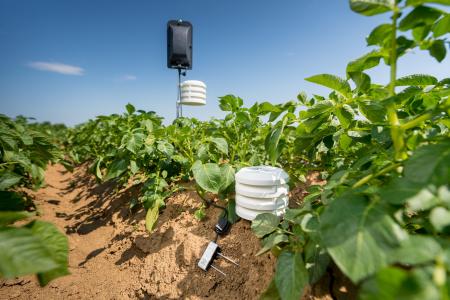The seventh edition of Bosch ConnectedWorld, one of the world’s largest industry events committed to showcasing the potential of the internet of things (IoT) took place on February 19–20 in Berlin, Germany. During this two-day industry event, Bosch demonstrated what IoT is already making possible today and what solutions will be making everyday life easier in the future, inclusive of sensitive AI robots in manufacturing, powerful computers for connected, automated mobility and smart homes.
Bosch.IO: new company pools the Bosch Group’s IoT and digital expertise
At Bosch ConnectedWorld 2020, Bosch consolidated its activities centered on the internet of things in a new subsidiary Bosch.IO, headquartered in Berlin, created by combining the former Bosch Software Innovations GmbH with other specialized IoT and digital teams at Bosch. For its IoT and digitalization projects, Bosch.IO collaborates with Bosch’s roughly 30,000 software developers and AI experts. With some 900 associates, Bosch.IO GmbH is now one of the driving forces for IoT (internet of things) solutions, covering everything from consulting to implementation and operation. What sets this new Bosch subsidiary apart is that its software and hardware developers work with cloud specialists and user experience designers on IoT projects of future importance. The core element of the Bosch subsidiary’s product portfolio is the Bosch IoT Suite. It is the central technical platform for IoT solutions.
Bosch IoT Suite connects cars, mobile machinery, and baby buggies
What do cars, mobile machinery, an energy provider’s data platform, and baby buggies have in common? Their connectivity comes courtesy of the Bosch IoT Suite, the core product of Bosch.IO. The subsidiary has already deployed its IoT platform to carry out more than 250 IoT projects jointly with customers in the retail, energy, building, manufacturing, consumer goods, agriculture, and mobility sectors. “Bosch.IO projects epitomize the efficient development of scalable and secure IoT solutions using the cloud and the open-source-based Bosch IoT Suite,” says Dr. Stefan Ferber, a member of the Bosch.IO executive management. The Bosch IoT Suite services customers opt for are then integrated into the cloud environments the customers prefer for their projects.
On this occasion, Bosch also presented solutions for connected mobility, industry, buildings and fields this year.
Bosch showcased smart solutions for the mobility and factories of today and tomorrow, buildings and infrastructure & agricultural machinery and farms at Bosch ConnectedWorld this year.
Powerful computing for the electronics architecture of the future – vehicle computers: One key to the vehicles of the future lies in the new high-performance vehicle control units. Bosch vehicle computers will increase computing power in vehicles by a factor of 1,000 by the start of the next decade. The company is already producing these kinds of computers for automated driving, the powertrain, and the integration of infotainment systems and driver assistance functions.
Higher transparency and efficiency in manufacturing and logistics – Nexeed: The Nexeed Industrial Application System for Industry 4.0 provides all manufacturing and logistics process data in a standardized format and highlights any potential for optimization. This system has already helped individual Bosch plants achieve efficiency gains of up to 25 percent. Nexeed Track and Trace can optimize logistics as well: it monitors and tracks loads and load carriers by instructing sensors and gateways to regularly report their location and status to the cloud.
Highly efficient supply of clean energy – stationary fuel cells: For Bosch, the solid-oxide fuel cell (SOFC) plays an important part in security of supply and energy-system flexibility. Bosch recently invested 90 million euros in the fuel-cell expert Ceres Power, increasing its stake to some 18 percent.
An eye on freshness, growth, and the weather – smart sensor systems: Bosch’s connected sensor systems help farmers keep a constant eye on external influences – and respond in good time. With Deepfield Connect Field Monitoring, users receive data about, for instance, the weather and plant growth, directly on their smartphones.
Bosch also established ethical “red lines” for the use of artificial intelligence (AI).
Bosch issued guidelines for the use of AI in its intelligent products. The company’s AI code of ethics is based on the following maxim: humans must retain control over all AI-based decisions. AI is a technology of vital importance for Bosch. By 2025, its aim is that every Bosch product will either contain AI or have been developed or manufactured with the help of AI. The company has set itself the goal of making its AI products safe, robust, and explainable. Over the next two years, Bosch plans to train 20,000 of its associates in the use of AI. Bosch’s AI code of ethics governing the responsible use of this technology will be part of this training program.
More than 170 speakers and 80 exhibitors
Bosch ConnectedWorld (February 19–20, 2020) brought together more than 80 exhibitors who showcased the latest trends and developments in the connected world. Among more than 170 speakers were Bosch CEO Volkmar Denner and Bosch CDO/CTO Michael Bolle, as well as Roland Busch (the deputy CEO of Siemens), Axel Stepken (the chairman of the board of management of TÜV Süd), and Scott Guthrie (executive vice president of Microsoft’s Cloud + AI Group). The event’s main features included keynote speeches, a major exhibition, and a hackathon.



